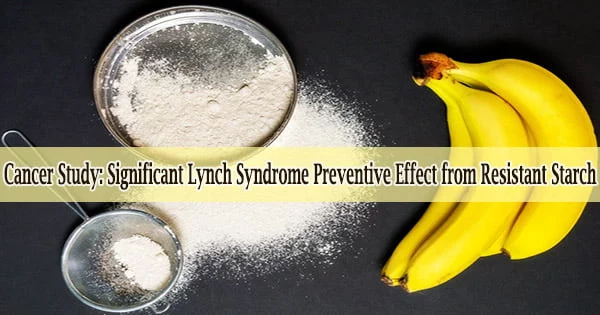Resistant starch, which is present in a variety of foods like oats, morning cereal, cooked and cooled pasta or rice, peas and beans, and somewhat green bananas, has been demonstrated to have a significant protective effect in those with a high hereditary risk of a wide spectrum of malignancies.
A regular intake of fermentable fiber, also known as resistant starch, taken for an average of two years had no effect on bowel cancers but reduced cancers in other parts of the body by more than half, according to the CAPP2 international trial, which included nearly 1000 Lynch syndrome patients from around the world.
This effect was more significant for malignancies of the upper gastrointestinal system, such as those of the oesophagus, stomach, biliary tract, pancreas, and duodenum. The astounding result was observed to persist for ten years after the supplement was stopped.
The study is a planned double-blind 10-year follow-up that is supplemented with thorough national cancer registry data for up to 20 years for 369 of the participants. It is led by experts from the Universities of Newcastle and Leeds and was published today in Cancer Prevention Research, a journal of the American Association for Cancer Research.
Aspirin reduced large bowel cancer by 50%, according to earlier studies released as part of the same trial.
“We found that resistant starch reduces a range of cancers by over 60%. The effect was most obvious in the upper part of the gut,” explained Professor John Mathers, professor of Human Nutrition at Newcastle University. “This is important as cancers of the upper GI tract are difficult to diagnose and often are not caught early on.”
In addition to being naturally present in peas, beans, oats, and other starchy foods, resistant starch can also be consumed as a powder supplement. The banana’s starch resists breakdown until it reaches the intestine, where it can alter the type of bacteria that reside there. The dose used in the research is comparable to consuming one banana daily.
We found that resistant starch reduces a range of cancers by over 60%. The effect was most obvious in the upper part of the gut. This is important as cancers of the upper GI tract are difficult to diagnose and often are not caught early on.
Professor John Mathers
“Resistant starch is a type of carbohydrate that isn’t digested in your small intestine, instead it ferments in your large intestine, feeding beneficial gut bacteria it acts in effect, like dietary fibre in your digestive system. This type of starch has several health benefits and fewer calories than regular starch.”
“We think that resistant starch may reduce cancer development by changing the bacterial metabolism of bile acids and to reduce those types of bile acids that can damage our DNA and eventually cause cancer. However, this needs further research,” says John Mathers.
Professor Sir John Burn, from Newcastle University and Newcastle Hospitals NHS Foundation Trust who ran the trial with Professor Mathers, said: “When we started the studies over 20 years ago, we thought that people with a genetic predisposition to colon cancer could help us to test whether we could reduce the risk of cancer with either aspirin or resistant starch.”
“Patients with Lynch syndrome are high risk as they are more likely to develop cancers so finding that aspirin can reduce the risk of large bowel cancers and resistant starch other cancers by half is vitally important. Based on our trial, NICE now recommends Aspirin for people at high genetic risk of cancer, the benefits are clear aspirin and resistant starch work.”
Long term study
Between 1999 and 2005, almost 1000 individuals started taking either aspirin, a placebo, or resistant starch in powder form twice daily for two years.
There was no overall difference between those who had taken aspirin or resistant starch and those who hadn’t at the end of the treatment phase. However, the study was planned for further follow-up since the research team expected a longer-term effect.
Only 5 new occurrences of upper GI malignancies were reported throughout the follow-up period among the 463 people who had taken the resistant starch, compared to 21 among the 455 who had received the placebo.
More than 1,800 Lynch syndrome patients have signed up for the CaPP3 worldwide trial, which is being coordinated by the team, to see if smaller, safer doses of aspirin may be used to help lower the risk of cancer. The research is funded by Cancer Research UK, the European Commission, Medical Research Council, and the National Institute for Health Research.





